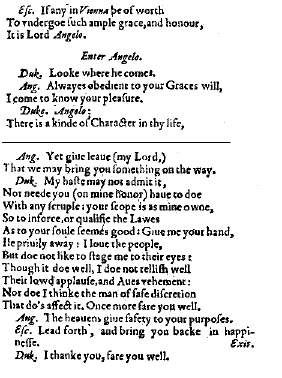Folio Comparision:
Act I, Scene 1
Main Menu - HomePage
- The Play
- Folio Comparisons |
|
|
ESCALUS.
If any in Vienna be of worth
To undergo such ample grace and honour,
It is Lord Angelo.
|
|
|
|
DUKE.
Look where he comes.
|
|
|
|
ANGELO.
Always obedient to your Grace's will,
I come to know your pleasure.
|
|
|
|
DUKE.
Angelo:
There is a kind of character in thy life,
|
|
|
|
ANGELO.
Yet give leave, my lord,
That we may bring you something on the way.
|
|
|
|
DUKE.
My haste may not admit it,
Nor need you (on mine honour) have to do
With any scruple: your scope is as mine own,
So to enforce or qualify the laws
As to your soul seems good. Give me your hand,
I'll privily away. I love the people,
But do not like to stage me to their eyes:
Through it do well, I do not relish well
Their loud applause and Aves vehement;
Nor do I think the man of safe discretion
That does affect it. Once more fare you well.
|
|
|
|
ANGELO.
The heavens give safety to your purposes!
|
|
|
|
ESCALUS.
Lead forth and bring you back in happiness!
|
|
|
|
DUKE.
I thank you. Fare you well.
|
|
|
 |
Note how the stage direction for Angelo's entrance precedes the Duke's line "looke where he comes." Also note, in the second Folio snippet, how the stage direction for the Duke's exit precedes his line, "I thanke you, fare you well." These two lines and their relationship to the stage directions illustrate how staging necessities often dictated dialogue. J.L. Styan in his book Shakespeare's Stagecraft points out that the configuration of the Globe Theatre dictated certain blocking and dialogue choices. Styan notes " the majority of entrances were made from upstage through one of two doors. If the actor felt the need, he could perambulate for up to fifty feet. ... On the Elizabethan stage, the actor was immediately on display" (Styan, 69). Styan also notes that the configuration of the Globe precluded a quick exit: "With no black-out switch, no curtain to drop, no door to slam, no convienant wing-piece to slip behind, the actor on the Elizabethan stage had always of himself to make a strong exit" (Styan, 78).
|
|
Main Menu - HomePage
- The Play
- Folio Comparisons |
